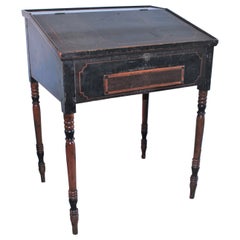Post Master Desk
Recent Sales
Antique Early 19th Century American Adirondack Desks and Writing Tables
Wood
Post Master Desk For Sale on 1stDibs
How Much is a Post Master Desk?
A Close Look at Adirondack Furniture
Evoking rusticity and relaxation through simple and elegant designs, vintage Adirondack furniture originated in the Adirondack Mountains of northeastern New York. The most famous piece is the Adirondack chair, which dates to 1903.
With its ample armrests and sturdy but comfortable slanted seat, the reclined Adirondack chair was designed by Thomas Lee for his own country home. The postwar golden age of modern patio and garden furniture production — led by the likes of Brown Jordan, Knoll, Salterini and Woodard — was decades away at the time, and there were few pieces of furniture specifically created for outdoor use.
Lee, a Massachusetts-born Harvard graduate raised in a wealthy family, was no furniture designer. He merely needed a durable, rugged chair for afternoons in the sun while he was vacationing on Lake Champlain in Westport, New York, in the summer. The amateur woodworker used just one wooden plank cut into 11 segments that were jointed together for his now-legendary seat, which is said to have been made of hemlock, hickory or basswood.
The story of the Adirondack chair continues with Lee’s friend, carpenter Harry Bunnell, covertly patenting the chair and going on to produce it as the Westport Plank chair for a growing audience over the next two decades. Over a century later, the Adirondack chair has gone through several design evolutions while maintaining its popularity and basic form with slats of wood such as pine offering comfort both indoors and out.
The widespread demand for rustic Adirondack outdoor furniture was bolstered by the turn-of-the-century establishment of rural escapes to treat diseases such as tuberculosis. The low-slung Adirondack chair became common in these places of convalescence, allowing patients to recline and breathe in the country air. It also complemented the camp-style architecture that was prevalent in the Adirondacks for recreation as well as restoration, where rugged furniture with exposed wood and minimal carving filled interiors and wide porches.
Today, Adirondack chairs are made in a range of materials and can be found around the world, from ski resorts to lakeside piers, their durability and classic form making them an enduring favorite for spending time in nature.
Find vintage Adirondack chairs, benches, lounge chairs, decorative objects, folk art and other furniture on 1stDibs.
Finding the Right Desks-writing-tables for You
Choosing the perfect writing desk or writing table is a profoundly personal journey, one that people have been embarking upon for centuries.
Queen Atossa of Persia, from her writing table circa 500 B.C., is said to have been the originator of the art of handwritten letters. Hers was reportedly the first in a long and colorful history of penned correspondence that grew in popularity alongside literacy. The demand for suitable writing desks, which would serve the composer of the letters as well as ensure the comfort of the recipient naturally followed, and the design of these necessary furnishings has evolved throughout history.
Once people began to seek freedom from the outwardly ornate styles of the walnut and rosewood writing desks and drafting tables introduced in the name of Queen Victoria and King Louis XV, radical shifts occurred, such as those that materialized during the Art Nouveau period, when designers longed to produce furniture inspired by the natural world’s beauty. A prime example is the work of the famous late-19th-century Spanish architect Antoni Gaudí — his rolltop desk featured deep side drawers and was adorned with carved motifs that paid tribute to nature. Gaudí regularly combined structural precision with decorative elements, creating beautiful pieces of furniture in wood and metal.
Soon afterward, preferences for sleek, geometric, stylized forms in furniture that saw an emphasis on natural wood grains and traditional craftsmanship took hold. Today, Art Deco desks are still favored by designers who seek to infuse interiors with an air of luxury. One of the most prominent figures of the Art Deco movement was French decorator and furniture designer Émile-Jacques Ruhlmann. With his use of neoclassical motifs as well as expensive and exotic materials such as imported dark woods and inlays of precious metals for his writing desks, Ruhlmann came to symbolize good taste and modernity.
The rise in appreciation for Scandinavian modernism continues to influence the design of contemporary writing desks. It employs the “no fuss” or “less is more” approach to creating a tasteful, sophisticated space. Sweden’s master cabinetmaker Bruno Mathsson created gallery-worthy designs that are as functional as they are beautiful. Finnish architect Alvar Aalto never viewed himself as an artist, but, like Mathsson, his furniture designs reflected a fondness for organic materials and a humanistic approach. Danish designers such as Hans Wegner introduced elegant shapes and lines to mid-century desks and writing tables, often working in oak and solid teak.
From vintage desks to contemporary styles, 1stDibs offers a broad spectrum of choices for conducting all personal and business writing and reading activities.
